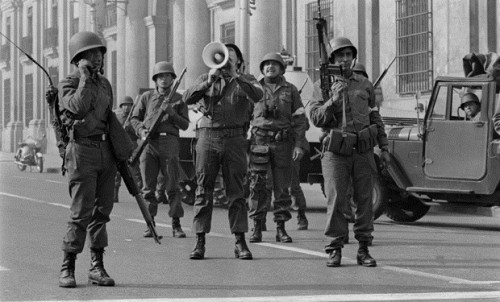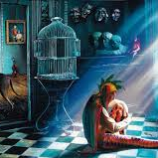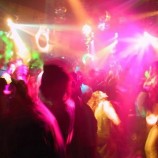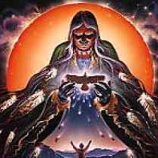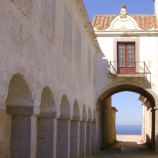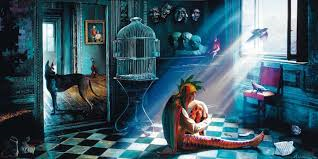9/11/2013 – Chile, 40 years after the military coup – part III
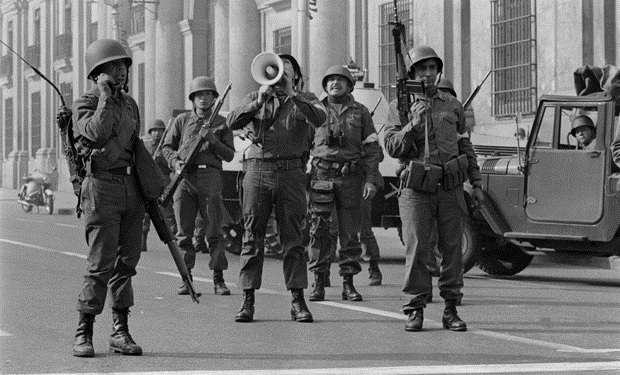
The Air Force: The “Diversionist” Strategy
On Monday morning, August 20th, 1973, President Salvador Allende took an air force helicopter towards the city of Chillán, where he hosted commemorations for the 195th birth anniversary of Bernardo O’Higgins. The pilots had previously devised an extremist idea; to go off course and kidnap the President, taking him somewhere into the south of Chile. Their intention was in response to the crisis that the Chilean Air Force, FACh, was undergoing, even if it meant setting off an entire state coup. However, they ended up canceling their plan en route.
FACh woke up that day in a state of exaltation. A few hours earlier, on Sunday night, Commander in Chief Gen. César Ruiz Danyau, had presented himself in uniform on the Channel 13 television program, “At This Time Improvise” Meanwhile, representatives of the opposition, the young leader Jaime Guzmán and Christian Democrat Jorge Navarrete, threw a feast to discuss their contradictions with the UP government. A somewhat gloomy party because none of the intelligent debaters ignored the very serious fact that an army general was participating in a political debate. What was even more serious was that Danyau Ruiz was no longer commander in chief.
Danyau Ruiz was the only commander-in-chief who Allende had known since before taking power, and which is why he believed to have kept some friendship with him. When the chief commanders were summoned to meet in a “national security” cabinet, of which the meeting’s main objective was to dismantle a recent truckers’ strike which began on July 26, he was allowed to choose whichever ministry he preferred to assume. On August 9, Ruiz Danyau swore oath as the Minister of Public Works and Transportation. His choosing had an unspeakable ulterior motive behind it: Ruiz Danyau wanted to prevent the government from squashing the transporters’ resistance organization.
But six days later, the Undersecretary of Transportation, Jaime Faivovich issued a warning announcement: the imminent and massive apprehension of trucks if the strike continued any further. Ruiz Danyau, feeling bypassed, tendered his immediate resignation as minister. Allende requested that he remain at his post for the moment because the strike was almost over. In view of Danyau Ruiz’s insistence, the president tried to get another FACh general to take the position. He soon realized that no one would accept without a more interesting offer, such as title of commander in chief. And that is exactly what he offered the two generals next in line of command, Gustavo Leigh and Gabriel van Schouwen. Although, neither wanted to accept until the Ruiz Danyau situation was resolved.
On the afternoon of August 17, after unbearable pressure, Ruiz Danyau signed his resignation from the ministry and FACh. The President carried the resignation slip in his pocket to a secret supper being held with the presence of DC Senator Patricio Aylwi, at the home of Cardinal Raúl Silva Henríquez.
General Leigh accepted on condition that he not assume the ministry. The President agreed that this position be given to another general, Humberto Magliochetti, breaking the terms that Ruiz Danyau had pressed for. Outraged by this change in affairs, the general decided that although he had signed a letter of resignation, he had not signed his resignation expedients, and thus his final situation was not yet sealed. He felt cheated.
The appointment of Leigh as commander-in-chief was effected on Saturday, August 18. Therefore, the appearance of Ruiz in Danyau on “At This Time Improvise” was, aside from unusual, a very serious disruption.
On the morning of the 20th, El Bosque air base officials in Cerrillos ordered a ‘self-quartering” which, according to the statement issued by the head of public relations for FACH, commander Ramon Gallegos, aimed to reject the governmental procedure to exonerate general Ruiz Danyau of his duties. Other bases in other provinces joined together in this effort. It was a full-scale insurrection. Shortly after midday, the Minister of Defense and Commander in Chief of the Army, General Carlos Prats, ordered his chief of staff, Gen. Augusto Pinochet and Commander in Chief of the Navy, Admiral Raúl Montero, to code red his main units in prevention any other major events.
Prats deliberately did not involve himself in the FACh crisis, before gaining assurance from General Leigh that the situation would be put under control. With Allende absent from La Moneda, Letelier’s subsequent duty was interior minister and to personally handle the situation. He requested PC that Orlando Millas assist him at his office. He gave instructions to Prats and the police, and ordered the quartermaster, Julio Stuardo, to shut down Radio Agriculture and inform him about what had happened to all the parties, except in the National Party.
Ruiz Danyau went to the base at Cerrillos that morning where around eighty officers were waiting his arrival to demand his return to command. After advising General Leigh, he went to the base at El Bosque, where around 200 officers were gathered in the main amphitheater. The meeting was anything but calm. In an air so thick you could cut it with a knife, the idea of obligating the government to reinstate Ruiz Danyau into office was prominent. It became very clear that neither the Army nor the Navy were up to an adventure of this magnitude.
When Leigh and other generals arrived they met with Ruiz Danyau. They criticized his conduct as ambivalent, the hubbub he caused at the airbases and especially his appearance on the TV program “At this time improvise.” Before the clock struck 7:00pm, Ruiz Danyau accepted leave from his duties and recognized Leigh’s authority. The new commander in chief went to La Moneda and reported to the President and ministers Prats and Letelier. When he returned from Chillán, Allende read a pacific nation-wide evening statement.
In consequence of the crisis, the next morning, on the 21th, some fifty women, who were later identified as wives of Air Force officers, gathered in front of the Ministry of Defence to protest and support Ruiz Danyau against Prats, who was directly attributed to the general’s fall out of power. Prats, with the flu and fever, compromised with the incident and went home after lunch. He had no idea what lay on the horizon.
Leigh wasn’t at all at ease with the situation. At least since the second half of 1972, he had been involved in a series of meetings with senior officials of FACh, the Navy, Army and even the police, the Carabineros, all with the common objective to overthrow the UP government. Already in June 1973, those meetings had gained the form of a conspiracy; they did not involve the commanders in chief, were held secretly and were outside of hierarchical rules.
As soon as he took over as head of FACh, Leigh notified his colleagues that they could no longer remain in silence. He gave political advice to the deputy chief of the Joint Chiefs of Staff, General Nicanor Diaz Road, a man much more vehement than himself, who was presently confronting the government in their efforts to incriminate ultra-left wing members for the assassination of the President’s naval aide, Captain Arturo Araya, despite the growing evidence the police had accumulated against ultra-right wing groups.
Leigh needed to be careful. This was the first board move in a strategy to dominate all senior positions in the military. The government did not trust him, but there was no alternative. They were counting on his constitutional obedience.
FACh also felt threatened from within. Two of their generals worked for the government and openly sympathized with it: Alberto Bachelet, appointed Directorate of Supply and Marketing, and Carlos Dinator, auditor. Both had been delicately isolated from the line of command, but Leigh knew that other officials and sub-officials sympathized with the UP and some had sons or nephews who were militarily active in government parties, or worse, members of the Leftist Revolutionary Movement, MIR. There was no way of calculating the deteriorative capacity to command in the case of an insurrection led by FACh. A hierarchal breakdown was not mere fantasy. Contributing to this idea, paradoxically, was the media, UP newspapers and magazines, who since August had been publishing lists of ‘coup perpetrator’ officials. Army commanders made interrogations as to the source of such information.
Leigh did not hide his intentions in one aspect: his application of the Law of Arms Control, a norm dictated in 1972 to limit what then seemed to be an increasing weapons possession rate in private hands. After tanquetaço on 29 June 1973, the military decided to apply this mandate more severely and the vanguard of this reinforcement was undertaken by the Armada and FACh.
The revolutionary sectors considered it a repressive law and condemned the military’s abuse in its reinforcement. Undoubtedly, these operations halted military training activities, weapons distribution and the accumulation of irregular forces in the bastions of the “people’s power.” The people were forced to at least remain clandestine and covert.
Between August and September, FACh took initiatives that went beyond their normal duties. Although the President supported the law, complaints from party supporters obligated them on several occasions to exhibit their reparation efforts to the head of FACh. Leigh, on the edge of his ability to dissimulate, made it known to Allende how “strange” it was the fact that no one had yet reported any de-weaponization of rightwing members.
The defense minister at the time, Orlando Letelier, highly distrusted Leigh. He believed, as Joan Garcés later said, that Leigh was the leader of the “diversion” which aimed to put the government at ease while the pieces were being placed for the coup.
Two military operations took things to a tipping point. The first took place on August 4th at Punta Arenas, at the Lanera Austral factory, where troops under the command of the Chief of the 5th Division, General Manuel Torres de la Cruz, came in at dawn and subjected the workers to a violent registration process and interrogation. One of them, Manuel Gonzalez, was shot dead. The troops found no weapons.
Allende sent two ministers, Jaime Toha and Sergio Insunza to investigate independently. The report they drew up revealed excessive use of force by soldiers of the IV Air Brigade. When Leigh, still Chief of Staff at FACh, received the report, he said he would study it, but on principle he estimated that it was a case of extreme measures.
One month later, on the evening of September 7th, a strong contingent of FACh set out to invade a neighboring facility of Sumar industries in San Joaquin. According to the military’s version of the story, while the operation was being carried out, the soldiers were attacked from inside the Sumar-Nylon factory, their reason for entering the factory. While the workers were forced out into the street, they were assailed by a concert of sirens and alarms while about 500 men started approaching. To avoid a confrontation, the FACh trucks withdrew… with 23 people arrested.
That night, Minister Letelier was having dinner at the home of General Prats and spoke several times with Leigh, trying to convince him to withdraw the troops. Then he summoned Leigh to his office Saturday morning, the 8th, along with the director of investigations, socialist Alfredo Joignant. For the sake of further irritating Leigh, Letelier said that the official investigation would be made by the civil police, and that henceforward the military would not perform any search and seizure without consultation and prior consent of the Minister himself.
Leigh did not confront these measures, but he felt as being pushed on the edge. Many years later, an army commander at the time, Ernesto Galaz said on the TV program “True Lies” on La Red channel, that among all the FACh officers, there were 10 % who sympathized with the UP and opposed a coup against the state, and another 10% had a “great aversion against the government.” The remaining 80%, he said, was people who did not support anyone, and that “were with whoever won.”
Related Articles


